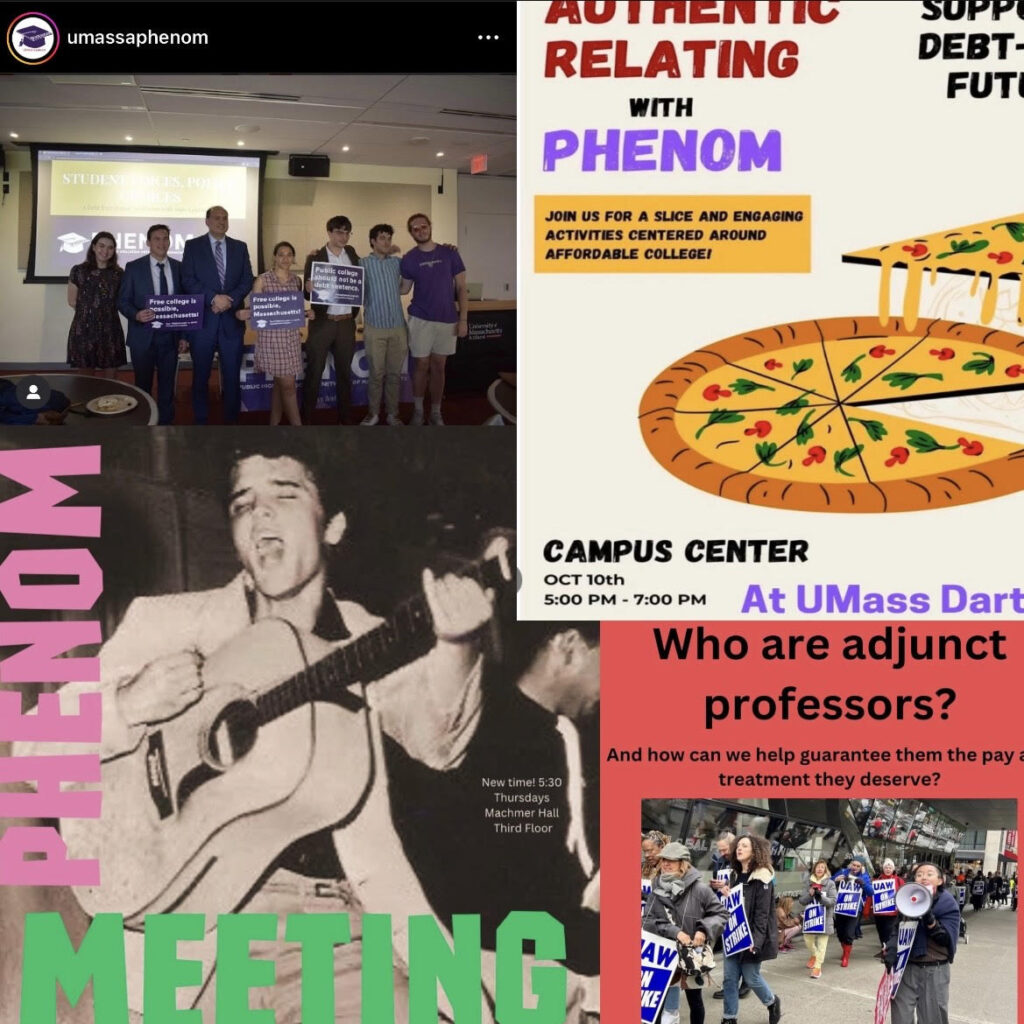Happy New Year and welcome back to The PHENOM Update, our official monthly newsletter where we keep you updated on recent goings on in our campaigns and around the higher ed world!
Looking Back, Looking Forward: How PHENOM Helped Win Free Community College in Massachusetts
As we go into the new year – and the new 2025-2026 legislative session – it is important to reflect on PHENOM’s part in the incredible victory of free community college (a.k.a MassEducate).
What strategies did PHENOM embrace that helped make free community college possible? What values has PHENOM dedicated itself to that have enabled us to remain laser-focused on the cause of eliminating college tuition? And how can we build on these triumphs going into 2025?
Of course, PHENOM is just one of many players who helped make the new MassEducate program a reality, the most obvious of which is the State House who finally took a stand after decades of approving tuition increases.
As the only statewide nonprofit in Massachusetts consistently fighting for tuition-free college above all else, this moment of progress is a testament to the power of long-term advocacy in the form of building lasting relationships with legislators, turning out constituents to town and city hall meetings, and writing compelling op-eds, infographics and letter campaigns to win hearts and minds.
The key to making all of these things happen has been harnessing the passion of the growing number of students who are fed up with our exploitative higher education system and know it does not have to be this way. Even more important than helping realize free community college has been the opportunity to develop these students’ talent to bring about even more radical change.
Through planning teach-ins, panel discussions, concerts, rallies, tabling, class raps as well as op-ed writing sessions, PHENOM develops students in its campus chapters into young leaders who can articulate the kind of reforms we need in higher education and how to achieve them.
Through these events and through the mentorship of senior PHENOM members, students learn about the nitty gritty of education policy, the problems facing Massachusetts higher education and the history behind them, as well as the complex relationships between nonprofits, unions, legislators and other political actors.
While honing these practical skills for effecting political change is crucial, at the heart of PHENOM’s impact has also been sticking to our values. After all, the whole point of any of us choosing to join this fight is because we believe fighting for what’s right does pay off; not only that, but someone has to do it if we want to achieve a society that works for all Americans, not just a few of us.
Within the past year, PHENOM under Executive Director Henry Morgan has foregone partnerships with donors that compromised our mission and left us without independence to carry out our unique mission of passing tuition-free college.
This could have put PHENOM at risk of dissolving if we didn’t play our cards right, as previous leaders’ fundraising decisions had made us overly dependent on the same donors we now had to break with in order to carry out our mission.
But that could never happen because we knew we had a world to win. We struck our own path and refused to tow the line of donors who did not believe in our bold vision of tuition-free college. Sure enough, because we believed in PHENOM as a vehicle for change, under Morgan’s leadership we have dug in and secured new, more diverse and more cooperative donors.
In a political environment that has for far too long neglected the interests of students for decades, PHENOM is teaching the Commonwealth to respect students once again. Because our crippling student debt crisis cannot go on any longer, and it never had to happen in the first place. And since the State House approved free community college, it looks like people are finally catching on.
PHENOM Announces New Financial Aid Reform Bill!
We are kicking off the New Year with legislation on financial aid reform! After financial aid programs such as MassGrant have failed to deliver aid to students due to delays and lack of advertising, PHENOM is seeking support for a bill that would increase students’ access to financial aid through:
– a user-friendly digital system with easy submission
– funding to train high-school guidance counselors on eligibility criteria
– a public website with an eligibility calculator and built-in application guidance
– awards renewable for five years based on 1) continued need, 2) eligibility, and 3) academic progress
– students’ right to judicial review, through which they will be able to 1) recover the full amount lost to faulty financial aid decisions, 2) be compensated for undue stress and hardship, 3) complete reimbursement for attorney’s fees, and additional remedies as determined by the court
Stay tuned for more information!
Stay in the loop and follow us on Instagram!
As we work to rally students and faculty across the state to fight for more affordable, fairer higher education, social media is the go-to way to keep our allies and communities up to date. Check out our official statewide Instagram page @massphenom, as well as our chapter pages @umassaphenom and @dartmouth_phenom!

In Other News
Overcrowding in community colleges: a crisis and an opportunity
Unsurprisingly, the Massachusetts State House’s decision to pass tuition-free college without dedicating more resources to campuses has led to rampant overcrowding that threatens these schools’ ability to operate. In turn, it could threaten the end of tuition-free community college as critics have argued the policy would just strain schools’ resources.
There is credence to the argument that it is easier to pass tuition-free community college and then get the necessary resources later; especially as its passage came at the conclusion of the 2023-2024 legislative session. But if this crisis continues too long to prevent the actual mission of community colleges, it could doom this promising program and, even worse, become an excuse to not pass tuition-free college of all kinds in the future.
This would be extremely grim if free community college ended just because Beacon Hill did not give colleges enough money to actually handle the milestone. Thus, forcing the State House to act and keep free community college alive by providing emergency funding to these beleaguered campuses will be one of the most important tasks going into the new year.
Is the 2025 “enrollment cliff” really such a big deal?
2025, the year of the dreaded enrollment cliff, has arrived. So how will this affect universities, how should higher education adapt, and how do we prevent special interests from using this narrative to cut funding and drain resources away from our public universities?
Based on this and other projections of the anticipated drop in enrollment – due to declining birth rates as well as declining interest in attending college – higher education experts predict that the number of students entering college in America will steadily decline after peaking this year.
Rather than a sudden, severe plunge, these predictions hold that these steady declines will result more in cuts to programs rather than a mass extinction event of universities. This comes as conservative critics are increasingly calling for less funding for higher education and redirection towards the trades and job training.
Responding to this kind of event is tough, though, just because of how varied its causes are. While the declining birth rate is one angle, another cause of students declining interest in attending college is simply how expensive it has become. Thus, how much of solving declining student enrollment has to do with, well, you know, actually making it affordable again?
Biden’s gainful employment policy
At the tail end of a tumultuous administration that has consistently gone to bat for student borrowers hurting from student debt (through debt relief and other policies), the Biden administration is capping off their run with one interesting policy known as “gainful employment”.
According to this policy, focused on career training programs, institutions will have to submit data by January 15 proving graduates will earn enough to afford the degree and pay off loans taken on. The idea is that, if colleges are going to charge students so much money for their programs, they should at least prove that it’s worth the price – and the decades of crippling debt.
This longer article takes a deeper look at higher-ed reforms conservatives are eyeing as the new administration is poised to take over. Basically, they amount to a more comprehensive, more punitive version of the above policy Biden’s administration is rolling out.
These Republicans argue universities should be penalized for graduates not having high enough salaries and even for being late on loan payments. In contrast, the Biden admin’s current policy only punishes for-profit colleges and career training programs.
In particular, these Republicans argue that colleges should pay the federal government for any loans that their students miss, an idea known as “risk-sharing” that Democrats such as Elizabeth Warren have also supported in the past. Other ideas, such as the conservative culture warrior Christopher Rufo’s belief the college student population should drop by 50 percent, are more suspect (to put it lightly).
These punitive measures could be one piece of the puzzle in making colleges cut tuition; especially as universities have for decades been complicit in their students accepting predatory loans they knew they were incapable of paying off.
Though this seems to let the student loan industry – as well as the state governments permitting higher and higher tuitions through underfunding – off the hook. Many public universities have had to raise tuition simply due to decades of state governments’ funding cuts, while student loan companies have enabled them to do so by lobbying for higher and higher borrowing limits that fatten their pockets.
Thus, it is more uncertain the effect this kind of policy would have if done for all college programs (and if done with so many penalties for institutions). Politicians on both sides of the aisle, as mentioned above, have expressed interest in doing this.
Critics worry that this will adversely affect smaller, less wealthy colleges that still are an important source of social mobility for lower-income students. (Still, any college’s potential for social mobility comes into doubt when they are putting students into high amounts of debt.)
Furthermore, there is the point that, especially for careers in the arts, earnings are much less predictable relative to the cost of the degree (i.e., less money comes with the territory and students should know that). Instead, the main problem is that the degrees are so pointlessly expensive to begin with. Thus, rather than focus so much on the amount of money a degree earns, the insane cost should be the biggest focus.
Sure, a student should know what they’re getting into when they study dance instead of accounting as far as job security goes. But that does not mean either of those degrees should put them $70,000 or more in debt. So can punishing universities be effective in reining in insane tuition prices and flawed degree programs without drastically affecting their vulnerable students?
